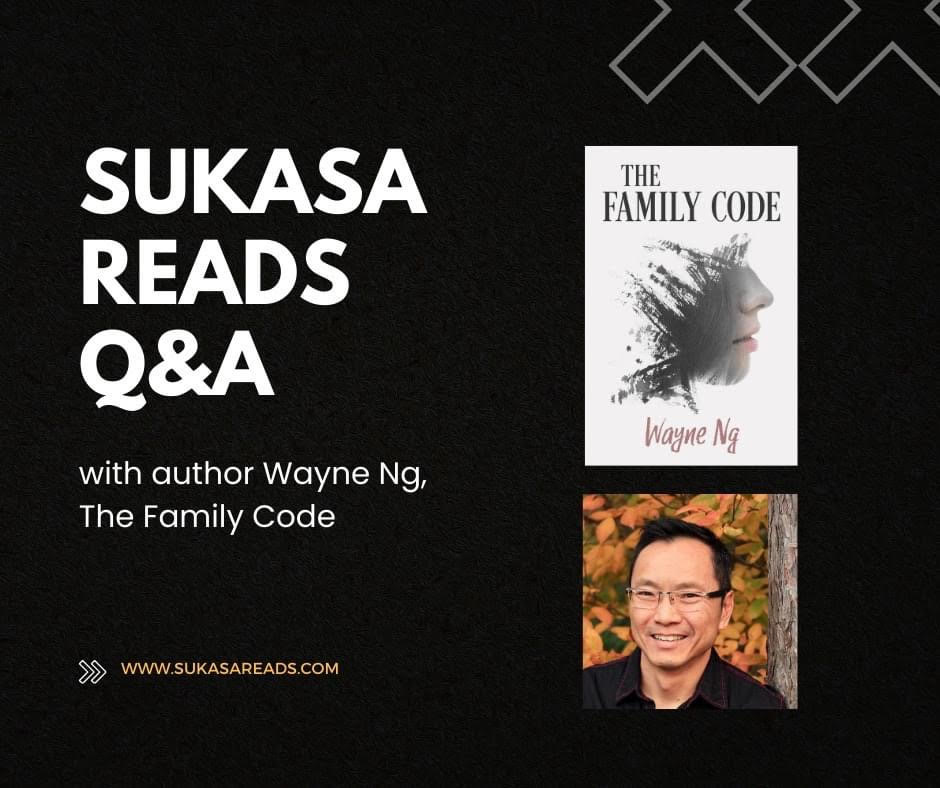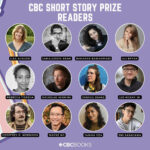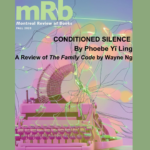Content architect and book blogger, Shilpa Raikar, treated Wayne to the full Sukasa Reads experience with a glowing review, an interview and video bites.
“Full of grit and heart, Wayne Ng’s The Family Code is one novel not to be missed. Not only does it ground you in today’s reality, but it features unforgettable characters that continue to live in your soul long after you’ve finished reading the book.”–Shilpa Raikar
X Video Bites – Beyond the Page with Wayne Ng
- Why is this story so important today?
- If you had a free afternoon to yourself, how would you spend it?
- How do we stop intergenerational Trauma?
- What book is on your bedside table right now?
- What is your favourite place to write?
- What did you want to be when you grew up?
- What was the impetus to write this story?
- Can you tell us anything about your next book?
- In The Family Code, happiness seems to be an elusive concept. What’s your idea of happiness?
Links to the video bites will be added once @ShilpaRaikar posts them on X. Follow her for other great reads.
Shilpa Raikar’s interview with Wayne is reproduced below from her Sukasa Reads website.
Sukasa Reads
Q&A with Wayne Ng, author of The Family Code
Full of grit and heart, Wayne Ng’s The Family Code is one novel not to be missed. Not only does it ground you in today’s reality, but it features unforgettable characters that continue to live in your soul long after you’ve finished reading the book.
Hannah Belenko is a single parent whose life is wrapped around the Canadian welfare and social services system, and is perpetually just hanging on. Her every action seems to have a negative reaction, and invariably every decision she makes affects her children.
Written from two perspectives – Hannah’s and her son Axel’s – the novel adds a layer of authenticity giving the reader a unique insight into the complexities of intergenerational trauma.
Award-winning author, Wayne Ng, has experienced these issues head on in his 30-year career as a social worker, and in this interview we get some behind the scene insights as to what makes The Family Code such an important read.
1. The Family Code is a story that punches you in the gut. The story of Hannah, a single mother haunted by past traumas, and who never seems to get a break. What’s the most important thing you want readers to get out of this book?
WN: I feel that many family stories are dominated by dissatisfied and disappointing white middle-class suburban narratives. I’ve enjoyed many of them, especially Ashley Audrain’s works. I want readers to realize that there are many other types of families and stories out there. Hannah’s is only one of them. However, Hannah might be readily dismissed. She externalizes her pain without any filters and comes across as unlikeable and crude. Yet she is as deserving of our empathy as the family member, friend or neighbour who similarly struggles but lacks Hannah’s coarseness. That is to say, people carrying unhealed, unresolved traumas and unmet needs…all of which drive their behaviours and choices.
I also hope readers applaud themselves for getting through a gritty, authentic but engaging story. The Family Code is filled with feelings and scenes that while authentic, might be uncomfortable and challenging for some. Like life, getting through difficult moments makes us more resilient readers and people. So take a bow for coming out of the emotional wringer.
2. Love the theme of this book. A lot of times it’s heartbreaking, but there’s an undertone of hope. Hannah has hope that her actions will generate positive outcomes, even though history has been against her. As a social worker, what changes would you like to see in the system that would give better access to opportunities for people like Hannah and her kids?
WN: The word hope is used about thirty-eight times in the novel and is the very last word. This was strategic…one must have hope even in the face of overwhelming adversity. As a social worker, we always had hope. Admittedly, it was dim at times. But, we believe in a world that could be better. We certainly would hope for more services and resources, and more respect and validation for mental wellness. We’ve made progress, but still have such a long road ahead. Sadly, the need, complexity and intensity have overwhelmed capacity, especially since the pandemic. Having said that, I don’t think hiring more bodies and creating more programs is in itself the only solution. We have core, systemic issues: the lack of affordable housing, growing economic disparity, a culture that values financial gain over community growth, and a continuing belief that we are only responsible for ourselves. The latter allows us to turn away from people like Hannah and Axel who barely survive in the margins.
3. This is not a typical story that falls within the immigrant/BIPOC diaspora. Hannah and Axel come from immigrant parents. It’s your first completed work of five, not featuring Asian protagonists. This is your first expression of your work. What do you looking to impart from The Family Code?
WN: True, this is my only work to date to not feature an Asian protagonist, yet my characters are very much products of immigrant parents. That is rarely mentioned by reviewers which implies immigrant stories are the purview of those who are racialized. I find that ghettoizing. Immigrants don’t all have the same stories or obstacles, nor do they all carry wounds and scars from places of origin. But make no mistake, past traumas and unhealed wounds can be carried by anyone and from any place.
I’d like to be a writer unafraid to take risks and explore as I develop my craft. Writing outside my lived experience is part of that, as is writing beyond Asian stories (not that there is anything wrong with that). Part of me is pleased that I was able to accomplish that. To be honest, I wonder if that comes from vestiges of my internalized racism or me just wanting to spread myself out as a writer.
4. Speaking of writing outside of lived experiences, you wrote points of view from a white woman and biracial boy. What was it like constructing those and how do you feel about others approaching narratives so far outside their own?
WN: As a social worker, I worked with hundreds and hundreds of Hannahs and Axels. They were always the loudest and most challenging clients. They were also my favourite. I’d make time for them and support them in sharing their lives. They’re embedded into me, so constructing those characters was first a privilege; but was also fun and easy to write.
Writing outside lived experiences is a hot and topical issue, bringing elements of appropriation and exploitation. I used characters from many backgrounds not my own–for example Indigenous, Black, Lebanese, queer, white male. Some might see that as ornamental. I could have played it safer. Yet my world is broad, and I am a writer. We make stuff up, and we try and do it responsibly and with sensitivity. We may not always get it right, but if we don’t try, we don’t learn and everyone’s world remains smaller than it should.
I do believe it’s acceptable to write outside yourself if you meet certain conditions and ask yourself certain questions:
- Proximity: Is my relationship to the material and subjects close or distant?
- Are you reinforcing conventions/stereotypes/tropes or challenging them?
- Am I fetishizing and glorifying the trauma of the characters, thereby objectifying them?
- It has to be well-written.
- It must be written with integrity.
I’ve worked in a white female-dominated profession in schools dominated by white-female staff. I’m happily married to a white woman, and I have always lived in Canada. So I think I have the proximity piece down. Some of the details about the Chinese family working in a restaurant, Jimmy’s Indigenous roots, and the hard-drinking Russian father do not break new ground. But I don’t believe I’ve objectified them. If I’m wrong, I deserve to be called on it. As to whether it’s a work of integrity and is well written, I think so, but you the reader must also decide.
~~~~
Thanks to Wayne Ng for taking the time to speak about The Family Code. Connect with Wayne at WayneNgWrites.com
Special thanks also to Chris Houston of The Idea Shop for connecting me with Wayne. Stay tuned on X and Instagram for short video bites with Wayne Ng.


